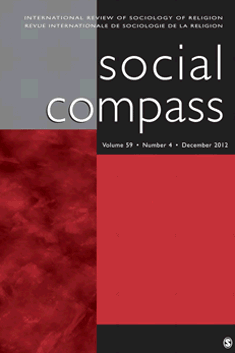
SOCIAL COMPASS
Scope & Guideline
Transforming Perspectives on Social Structures
Introduction
Aims and Scopes
- Interdisciplinary Studies of Religion:
The journal emphasizes the intersection of religion with other social phenomena, encouraging contributions that analyze religious practices, beliefs, and identities through various disciplinary lenses. - Global Perspectives on Religiosity:
It seeks to understand and document diverse religious experiences and transformations across different cultural and geographical contexts, reflecting on how globalization affects local religious practices. - Exploration of Secularism and Non-Religion:
A significant focus is placed on secularism and the experiences of non-religious individuals and groups, examining how these identities interact with traditional religious frameworks. - Methodological Innovations:
'Social Compass' promotes the use of innovative and reflexive methodologies in studying religion, spirituality, and secularism, including qualitative, quantitative, and mixed-method approaches. - Engagement with Contemporary Social Issues:
The journal addresses pressing social issues such as gender, sexuality, environmentalism, and political movements, exploring how these intersect with religious beliefs and practices. - Youth and Religion:
A notable emphasis is placed on the exploration of youth engagement with religion and spirituality, particularly how younger generations navigate their identities in a changing social landscape. - Religious Diversity and Pluralism:
The journal examines the dynamics of religious pluralism and the coexistence of multiple faiths within societies, focusing on interfaith dialogues and conflicts.
Trending and Emerging
- Environmental Spirituality:
Recent publications increasingly explore the intersection of spirituality and environmental issues, reflecting a growing recognition of the role that religious beliefs play in environmental activism and eco-theology. - Intersectionality in Religious Studies:
There is a marked trend towards examining intersectional identities within religious contexts, particularly how gender, sexuality, and race influence religious experiences and practices. - Youth Activism and Religion:
The journal is witnessing an upsurge in research focused on young people's activism within religious contexts, highlighting how youth engage with social justice issues, including climate change and LGBTQ+ rights. - Transnational Religious Movements:
Emerging themes include the study of transnational religious movements and their impact on local cultures, reflecting the globalized nature of contemporary religious practice. - Spirituality in Crisis Contexts:
There is an increasing focus on how spirituality manifests in crisis situations (e.g., pandemics, migration), examining the role of faith in coping mechanisms and community resilience. - Digital Religion:
The exploration of how digital technologies affect religious practice and community formation is gaining traction, with studies examining online religious communities and digital expressions of faith.
Declining or Waning
- Traditional Religious Authority:
There has been a noticeable decline in papers that focus on established religious authorities and institutions. The journal's recent issues have shifted towards more grassroots and lived experiences of religion, moving away from traditional hierarchical structures. - Historical Analysis of Religions:
Themes centered around historical analysis of specific religions, particularly those that do not connect to contemporary issues, are less frequently represented. The focus has shifted towards current social dynamics and their implications for religious practices. - Exclusively Theoretical Discussions:
Papers that solely engage in theoretical discourse without empirical grounding are becoming less common. The journal is increasingly favoring research that combines theory with practical case studies and real-world implications. - Static Views of Secularism:
Contributions that depict secularism as a fixed or unchanging phenomenon are declining. Instead, the journal is increasingly interested in the dynamic and fluid nature of secular identities and practices. - Focus on Major World Religions:
There is a waning interest in studies that focus exclusively on major world religions (e.g., Christianity, Islam, Judaism) without considering the broader context of syncretism and emerging spiritual movements.
Similar Journals

Cultura y Religion
Connecting diverse narratives of culture and spirituality.Cultura y Religión is a pioneering academic journal dedicated to exploring the intersections of culture and religion within various socio-cultural contexts. Published by the Universidad Arturo Prat's Instituto de Estudios Indígenas, this journal has been an invaluable resource for researchers, professionals, and students since its inception, adopting an Open Access model since 2007 to enhance the dissemination of knowledge. With an ISSN of 0718-5472 and an E-ISSN of 0718-4727, this journal aims to provide a multidisciplinary platform for the examination of religious practices, beliefs, and their cultural implications, particularly in indigenous contexts. Situated in Iquique, Tarapacá, Chile, Cultura y Religión plays a critical role in enriching the academic discourse and fostering a deeper understanding of the cultural dimensions of religion, making it a must-read for those invested in cultural studies, anthropology, and religious studies.

JOURNAL OF CHURCH AND STATE
Charting New Territories in Church-State RelationsJournal of Church and State is a leading interdisciplinary journal dedicated to the exploration of the complex relationships between religion and government, published by Oxford University Press. With an ISSN of 0021-969X and an impressive E-ISSN of 2040-4867, this journal serves as an essential platform for scholars in the fields of History, Religious Studies, and Sociology and Political Science. Recognized for its scholarly contributions, it holds a prestigious Q1 ranking in both History and Religious Studies, positioning it among the top journals in these disciplines for 2023. The journal’s robust scope spans historical perspectives, contemporary debates, and critical analyses related to church-state interactions, making it indispensable for researchers, professionals, and students alike. With access options that reflect its academic integrity, the Journal of Church and State continues to enrich scholarly discourse and foster a deeper understanding of religious influences on governance and vice versa.

Bilimname
Innovating Research in Islamic Studies and BeyondBilimname is a distinguished academic journal published by the ILAHIYAT BILIMLERI ARASTIRMA VAKFI, dedicated to advancing knowledge in the fields of Islamic studies, theology, and social sciences. With its E-ISSN: 2148-5860, this open-access journal provides a platform for researchers, scholars, and students alike to publish and share innovative ideas and groundbreaking research. While specific metrics such as H-Index and Scopus ranks are currently unavailable, Bilimname continues to foster academic discourse and engagement, making it an essential resource for individuals keen on exploring contemporary issues within its scope. Located in Kayseri, Turkey, the journal aims to bridge theoretical insights with practical applications, thereby contributing significantly to the academic community and shaping future research in relevant disciplines.

RELIGION
Illuminating the Intersection of Belief and CultureRELIGION, published by Routledge Journals, Taylor & Francis Ltd, stands as a preeminent scholarly journal dedicated to the multifaceted study of religion across various disciplines. With an ISSN of 0048-721X and an E-ISSN of 1096-1151, this journal provides a rich platform for the exploration of religious phenomena, their historical contexts, and their sociopolitical implications. Since its inception in 1971, RELIGION has continually adapted to the evolving landscape of religious studies and maintains a prestigious Q1 ranking in History and Q2 in Sociology and Political Science, affirming its significance within these fields. Researchers and professionals will benefit from a robust selection of peer-reviewed articles that engage with contemporary issues, making significant contributions to both academic discourse and practical applications in society. While the journal is not open access, it continues to reach a wide audience, enhancing understanding in a diverse range of religious contexts and practices. This journal not only captures the pulse of current debates but also shapes the trajectory of future scholarship.
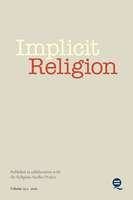
Implicit Religion
Unpacking Spirituality Beyond the SurfaceImplicit Religion is a distinguished journal published by EQUINOX PUBLISHING LTD, focusing on the intricate relationships between faith, spirituality, and everyday life within the realm of Religious Studies. With its ISSN 1463-9955 and E-ISSN 1743-1697, the journal has garnered attention for its interdisciplinary approach, engaging scholars and practitioners alike in critical discourse since its inception in 2011. Recognized within the Q2 category of Religious Studies for 2023, it plays an imperative role in unpacking the nuances of implicit religious practices and beliefs, offering a platform for original research, theoretical papers, and critical reviews. Although primarily a subscription-based journal, Implicit Religion remains a vital resource for anyone seeking to deepen their understanding of how implicit forms of spirituality shape personal and communal identities. The journal is based in the United Kingdom at 415, The Workstation, 15 Paternoster Row, Sheffield S1 2BX, England, and continues to address the emerging trends and challenges within the field.

Politics and Religion Journal
Innovative Insights into Faith and Political DynamicsPolitics and Religion Journal, published by the CENTER STUDY RELIGION & RELIGIOUS TOLERANCE in Serbia, stands as a pivotal platform for scholarly dialogue at the intersection of political science, sociology, and religious studies. Established as an Open Access journal since 2007, it provides unrestricted access to research findings, fostering a comprehensive understanding of how religion influences political dynamics across various cultures and societies. With ISSN 1820-6581 and E-ISSN 1820-659X, the journal has consistently contributed to the academic discourse, evident in its ranking within the 63rd percentile for Religious Studies and 22nd percentile for Sociology and Political Science, according to Scopus metrics. The journal aims to present innovative research, critical essays, and reviews that examine the nuanced relationships between faith, governance, and societal norms, ultimately enhancing the dialogue among researchers, professionals, and students globally.
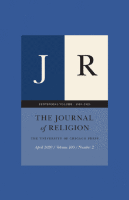
JOURNAL OF RELIGION
Exploring the Depths of Faith and ThoughtJOURNAL OF RELIGION, published by University of Chicago Press, stands as a prominent scholarly platform in the field of religious studies. With an ISSN of 0022-4189 and an E-ISSN of 1549-6538, this journal has been serving the academic community since its inception in 1982, providing a crucial forum for innovative research and critical analysis of various religious phenomena. The journal's placement in the Q3 category for Religious Studies and its ranking in the 66th percentile among peers underscore its impact within the academic landscape, making it a valuable resource for researchers and professionals alike. Although it does not offer open access, the journal remains committed to advancing knowledge in the discipline, targeting a diverse audience from students to established scholars. With upcoming issues extending to 2024, JOURNAL OF RELIGION continues to foster interdisciplinary dialogue and contribute to the understanding of religion in contemporary society.
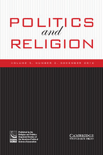
Politics and Religion
Bridging the Divide Between Politics and SpiritualityPolitics and Religion is a leading journal published by Cambridge University Press, focusing on the intricate interrelationships between political systems and religious beliefs. With an ISSN of 1755-0483 and an E-ISSN of 1755-0491, this esteemed journal has achieved notable recognition, being classified in the Q1 category for Religious Studies and Q2 in Sociology and Political Science in 2023. Its exceptional standing is underscored by its Scopus rankings, placing it in the 98th percentile for Religious Studies and 73rd percentile for Sociology and Political Science. Spanning research and discourse from 2008 to 2024, the journal aims to foster a deeper understanding of how political ideologies shape and are shaped by religious contexts globally. Though not open access, the journal remains a crucial resource for researchers, professionals, and students eager to explore contemporary issues at the intersection of faith and governance, uncovering insights that are relevant to diverse audiences throughout the United Kingdom and beyond.
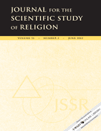
JOURNAL FOR THE SCIENTIFIC STUDY OF RELIGION
Transforming Religious Studies Through Empirical ExcellenceJOURNAL FOR THE SCIENTIFIC STUDY OF RELIGION is a leading academic journal published by Wiley, dedicated to advancing the field of religious studies through rigorous empirical research and theoretical exploration. With an impressive impact factor and ranking in the Q1 category for Religious Studies, this journal has established itself as a vital resource for scholars, researchers, and students alike, positioning itself at the forefront of the discipline. Since its inception in 1977, it has provided a platform for innovative studies that explore the complexities of religion and its role in society, culture, and individual behavior. The journal is recognized among the top-tier publications in the field, holding a remarkable rank (#7 out of 644) in Scopus, reflecting the high standards of scholarship and research it publishes. Despite its non-open access nature, the journal is committed to disseminating valuable insights and fostering academic dialogue among professionals passionate about the scientific study of religion.
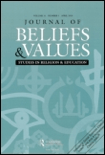
Journal of Beliefs & Values-Studies in Religion & Education
Exploring the Intersection of Faith and LearningThe Journal of Beliefs & Values - Studies in Religion & Education is a pivotal interdisciplinary publication that delves into the complex relationship between religious beliefs and educational practices. Published by Routledge Journals, Taylor & Francis Ltd, this esteemed journal offers a platform for rigorous research, insightful commentary, and in-depth analyses that contribute to the fields of both education and religious studies. Since its inception in 1984, the journal has grown to encompass a diverse range of topics, making significant contributions to the discourse around faith, values, and their influence on educational paradigms. With a commendable Q1 ranking in Religious Studies and a Q3 ranking in Education as of 2023, it hosts high-impact articles that are ranked in the top percentile of Scopus metrics. The journal is published in the UK and holds an important place for researchers, educators, and policymakers seeking to understand the interplay of religious beliefs and educational frameworks. By providing high-quality, scholarly articles, the Journal of Beliefs & Values continues to facilitate essential conversations that shape both academic inquiry and practical applications in educational settings.